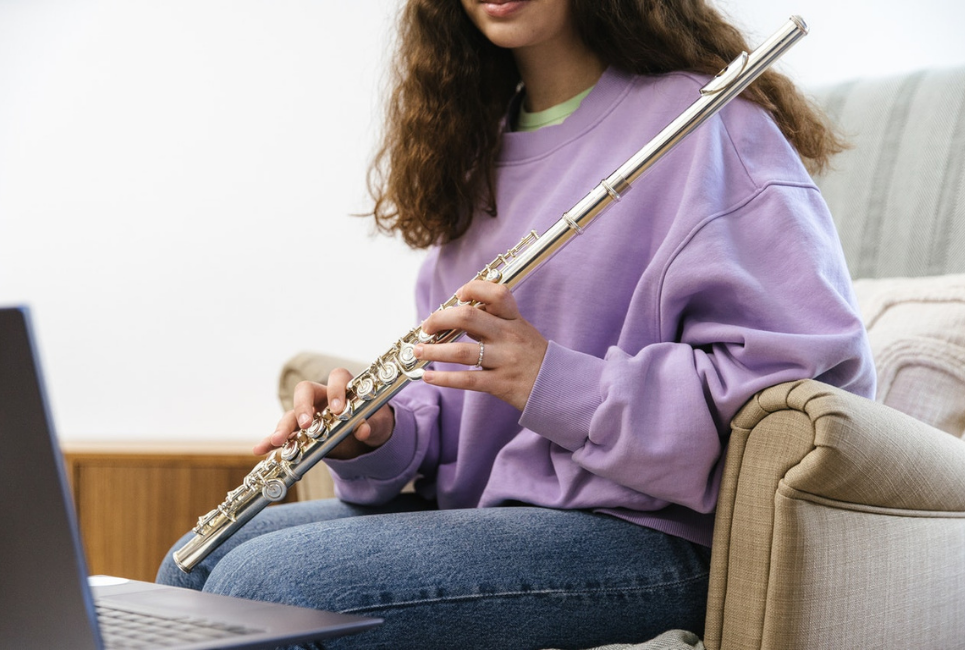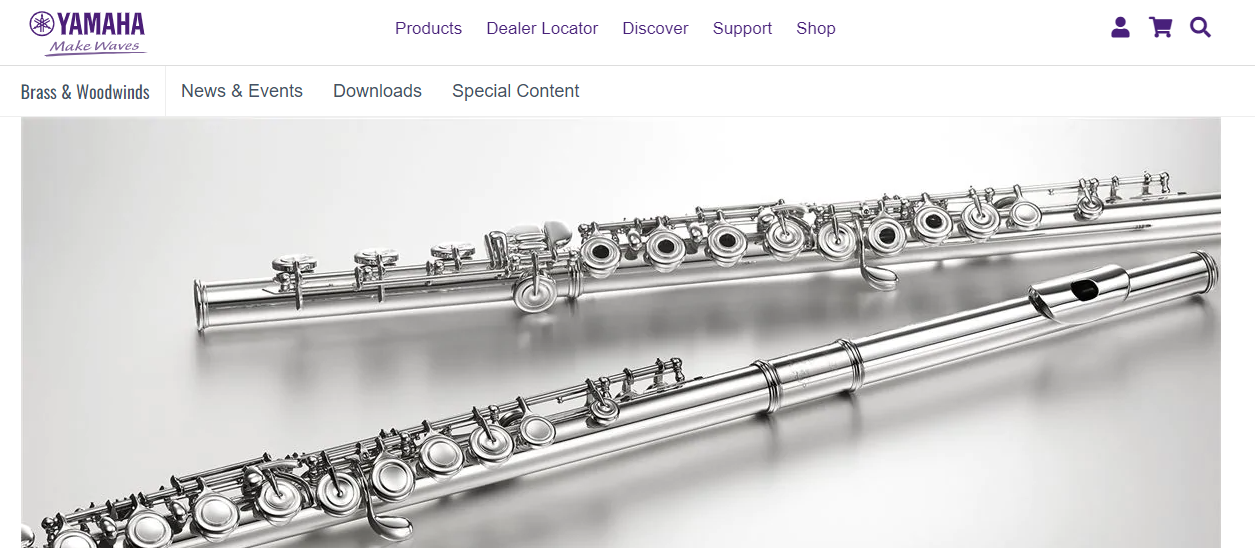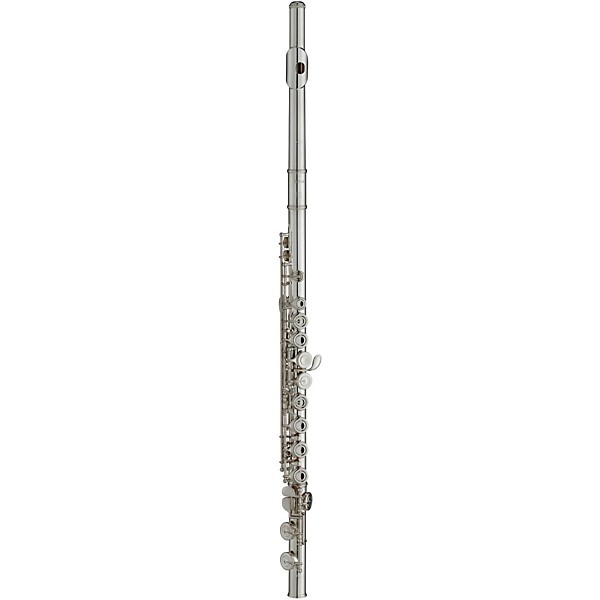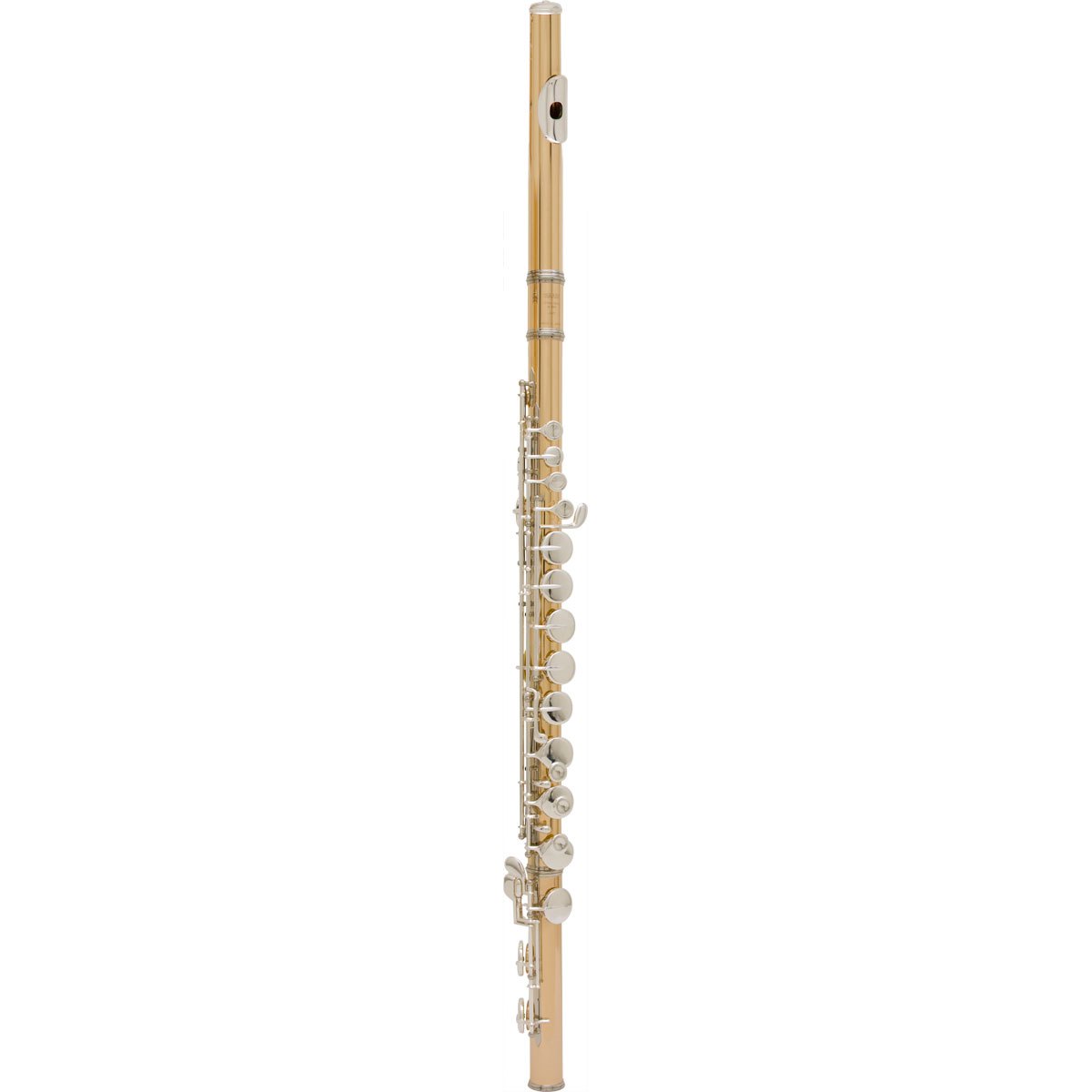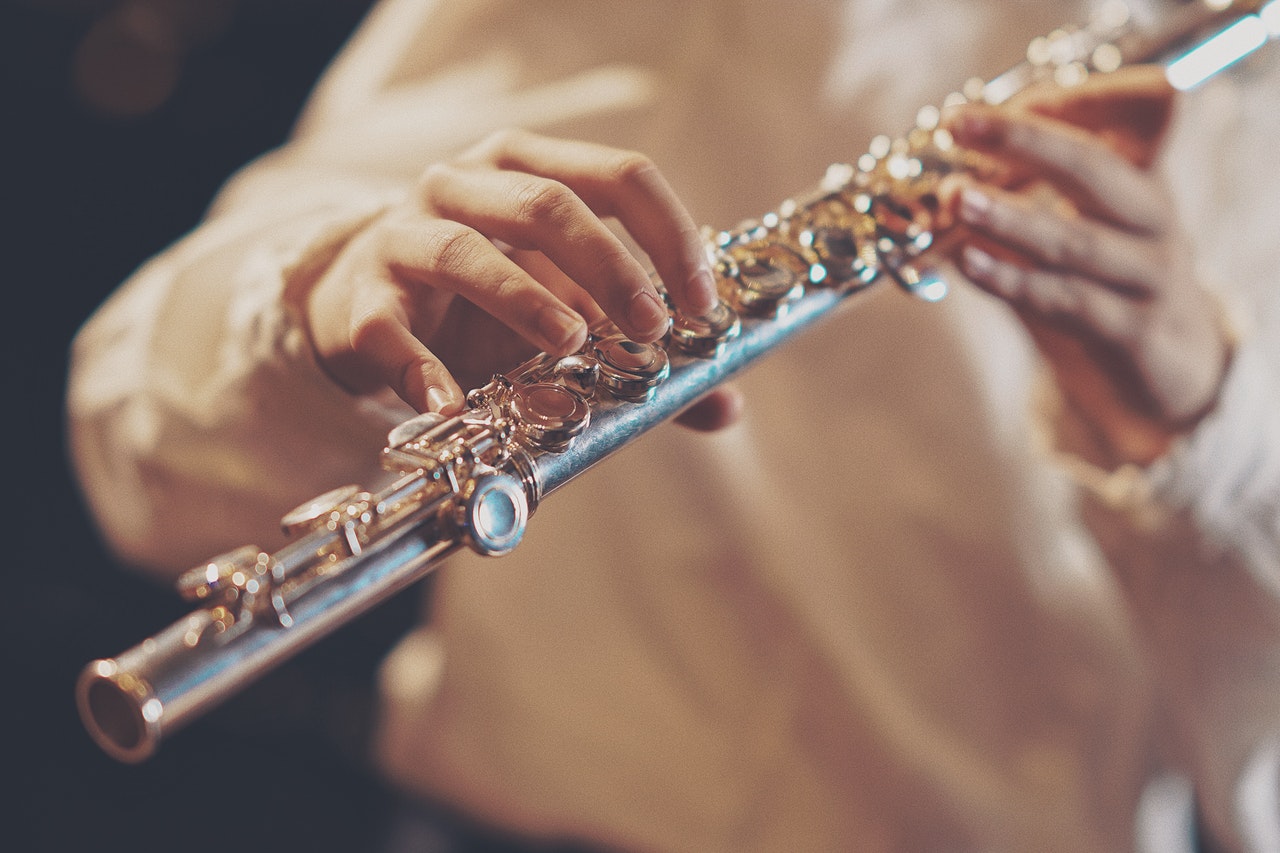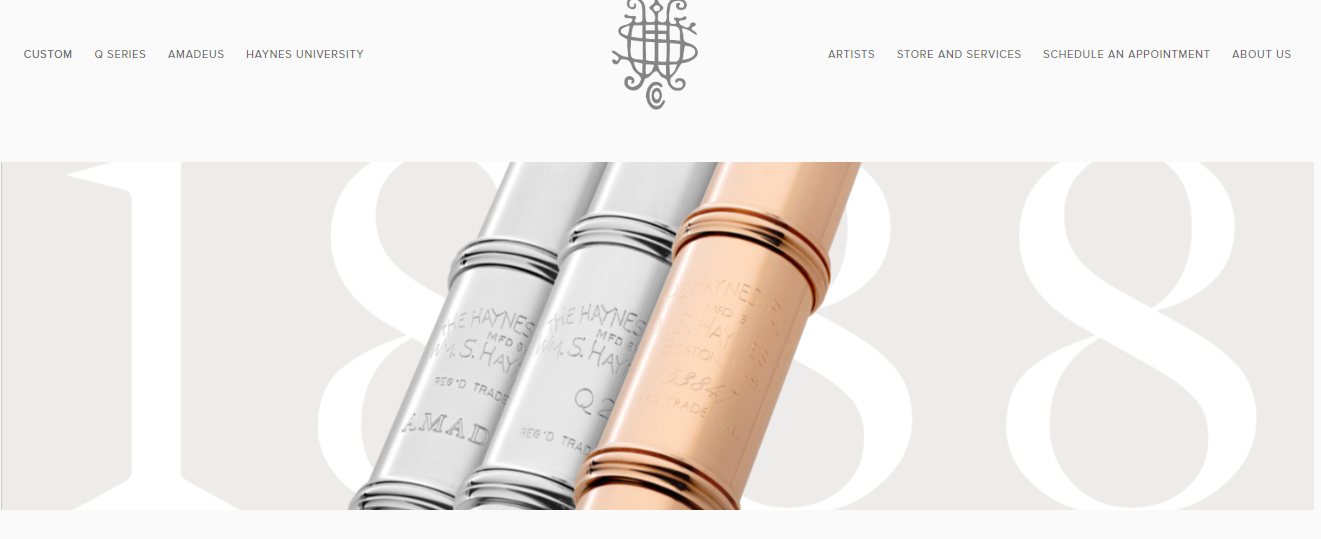- How to Find the Best Sopranino Saxophone - May 31, 2022
- How to Find the Best Contrabass Saxophone - May 30, 2022
- Trumpet Range Guide: Understanding The Entire Trumpet Range - May 19, 2022
Yamaha makes almost any band or orchestral instrument, including flutes. Whether you’re a beginner or professional, you should know about the best Yamaha flute options.
Then, you’ll be able to choose a model that works for you and your playing. You can enjoy practicing, which can help you get even better at the instrument.
Bottom Line Up Front
Yamaha flutes range from beginner to professional and piccolo to bass flute. Start with the Yamaha YFL-222 since it’s easy to play, regardless of your level.
Best Yamaha Flute Options
When shopping for the best flute for you, the brand Yamaha may come up. It’s a fantastic option, especially for beginner flute students.
But professionals and intermediate players can also find a good Yamaha model. There are flutes at every level and price range, so you can start on a Yamaha and upgrade within the family of flutes.
It was hard to come up with selection criteria since they’re all from one brand. However, I chose models at a variety of levels and price points as well as different types of flutes. I looked for models with a good reputation and that is easy to find.
Here are some of the best Yamaha flute models as well as some piccolo and low flute options.
Yamaha YFL-222
The Yamaha YFL-222 is an amazing beginner flute model. While I didn’t start on a Yamaha, I know a lot of flute players do, at least in the United States.
Yamaha is a common brand you’ll find at music stores with instrument rental programs. The 222 is a silver-plated flute with closed holes, so it’s perfect for the new player.
It also features an offset G key and a low C foot joint, so you can play most flute music on it. But you may find that it starts to hold you back after a couple of years of consistent practice and improvement.
Pros
- Easy to play
- Great specs
- Durable
- Lasts a while
- Common option
Cons
- Not for advanced players
- Risk of counterfeit
Yamaha YFL-362
After you’ve been playing a while, you may want to upgrade to the Yamaha YFL-362. This flute features a solid silver head joint, so you can get a warmer sound, and you can pay extra for a gold lip plate.
You also get open holes, so you need to learn proper finger positions to fully close the holes. Then, you get a low B foot joint, so you can play a half step lower than on most student models.
This model has pointed key arms, which look fancy though don’t do much for your sound. Still, this is a great flute for serious students, and it’s not too expensive.
Pros
- Helps you learn a good hand position
- Easy to play
- Great upgrade
- Affordable
- Looks and sounds nice
Cons
- Not for beginners
- Not full silver
Yamaha YFL-462
Another step-up or intermediate flute to try is the Yamaha YFL-462. This model features a solid silver head joint and body, so you may get a slightly warmer, fuller sound than on the 362.
It also comes with the option of getting a gold-plated lip plate. That’s a nice option for someone with a silver or nickel allergy, but it won’t do much for the sound.
The pointed key arms make the flute look like a professional model. While it’s more expensive than the 362, it’s still a decent price and is great for college students and adult amateurs.
Pros
- Good sound
- Easy to play
- Suitable for people with allergies
- Nice for serious players
- Looks great
Cons
- Expensive for what you get
- Not for beginners
Yamaha 577H
The Yamaha 577H has a lot of the same specs as the 362. However, this model is handmade, so it’s a bit more expensive than the intermediate version.
It comes with a silver headjoint with the option for a gold lip plate. The body is silver plated to keep costs down while still giving you an excellent intro to professional flutes.
You get an offset G to keep your left-hand ring finger from having to stretch. The holes are open, and you have a low B foot joint so that you can play most flute parts.
Pros
- Professional model
- Easy to play
- Good sound
- Looks great
- Durable
Cons
- Not for beginners
- A bit expensive
Yamaha 677H
The Yamaha 677H is another professional flute model, but this one features a solid silver body. It comes with the same head joint you’d get with the 577H.
You’ll get Straubinger pads, which are common among professional flutes. However, you’ll need to take your flute to a Straubinger-certified technician for maintenance.
This flute has silver-plated keys to keep the cost from getting too high. It’s a good option for a professional or even a serious amateur who needs the best flute they can afford.
Pros
- Great sound
- Professional features
- Handmade
- Easy to play
- Not the most expensive
Cons
- Require maintenance from certain techs
- Not for beginners
Yamaha 777H
Another fantastic professional flute to try is the Yamaha 777H. This model is full of silver, including the keys, so you can get a warm sound on it.
It features the same Straubinger pads as the 677H, so you may need to find a specialist technician. But you can use this flute for a long time as long as you take good care of it.
However, the extra silver makes this flute quite a bit more expensive than the other Yamaha C flutes. Still, it’s not as expensive as some models from other brands.
Pros
- Great for professionals
- Lasts a long time
- Full silver
- Handmade
- Sounds fantastic
Cons
- Quite expensive
- Has special pads
Yamaha YPC-32
If you want to expand your skills and play the piccolo flute, try the Yamaha YPC-32. This piccolo features a metal head joint and a plastic body, so it’s great for playing outdoors.
The metal parts are all silver-plated, which keeps this model from being too expensive. However, it does cost more than piccolos with similar specs from other brands.
Still, it’s easy to play, and it sounds good in an ensemble with other musicians. You should test this piccolo when looking for a beginner model.
Pros
- Great for beginners
- Easy to play
- Nice sound
- Blends well
- Works outside
Cons
- A bit expensive
- Not for professionals
Yamaha YPC-62
The Yamaha YPC-62 is another amazing piccolo, and this one is wood. That makes it a perfect choice for playing in an orchestra or another group inside.
However, you’ll need to be careful not to take it from one extreme temperature to another. The wood can crack if you aren’t careful, and the repair may cost well over $100 depending on the size of the crack.
When buying this model, you can get the YPC-62R, which comes with a wave headjoint. Meanwhile, the 62 comes with a traditional headjoint.
Pros
- Wood model
- Easy to play
- Great for ensembles
- For advanced players
- Not too expensive
Cons
- Weak low register
- Not for beginners
Yamaha A421BII
When I was in college, I got to play the alto flute in the flute choir. One of the models my college owned was the Yamaha A421BII, which comes with both a straight and curved head joint.
That makes it a great option for beginners who want to test out both styles. Unlike other alto flutes, this one uses gold brass, so it looks and sounds unique.
Blending with other flutes is easy, and this model stays in tune pretty well. However, the gold brass and perhaps other features make it much more expensive than some alto flutes out there.
Pros
- Comes with both headjoints
- Easy to play
- Good intonation
- Looks great
- Nice sound
Cons
- Expensive
- Not for every player
Yamaha B441
The Yamaha B441 is a bass flute, which plays an octave below the regular flute. Like the Yamaha alto, this bass flute uses gold brass, which looks and sounds great.
I also got to play on this model a bit during college. It was easy to tune like the alto flute. As with many bass flutes, this one comes with a crutch that helps you support the instrument with your left hand.
This is a great option for serious bass flute players or for a teacher or ensemble director to share with students. But it does cost a lot more than some bass flutes.
Pros
- Great for serious players
- Nice sound
- Unique look
- Easy to play
Cons
- Has some maintenance issues
- Very expensive
How to Choose a Yamaha Flute
Knowing about the best Yamaha flutes is great, but that doesn’t necessarily help you choose the one for you. For one, some of the Yamaha flutes aren’t comparable.
The YFL-222 and 777H are both great, but they’re for completely different types of flute players. That’s why you should consider your situation when shopping for a flute.
Here are some other factors to think about as you narrow your search for an instrument.
Consider Your Level
If you’re a beginner, the Yamaha YFL-222 is hands down the best Yamaha flute for you. However, when you reach the intermediate or professional level, you have more options.
Intermediate players can choose between the 362 and 462. Meanwhile, professionals should try the 577H, 677H, and 777H to figure out the best fit.
Knowing your level can help narrow your search within the Yamaha flute line. That way, you can choose a model that meets your needs and can help you improve your playing.
Look at the Specs
Another factor that can affect your decision is the specs of each flute model. You have to decide if you want a full silver flute or if you’re okay with some silver plating.
It’s also important to think about if you have the option to add extra keys, such as a split E mechanism or C# trill key. These options are usually available on the more advanced models.
Knowing what features you need or want is crucial for choosing a flute. That way, you don’t end up with a flute you’ll need to replace in a few months.
Also, keep in mind that some specs change the model number of a Yamaha flute. For example, closed-hole models usually have a 2 as the second number.
Decide on Upgrades
When buying a Yamaha flute, consider if you want any specs that aren’t standard. At the intermediate level, you can usually add extra keys, but that will increase the cost of the flute.
Some upgrades are well worth it, while others may be a waste of money. For example, I love having a C# trill key, but I don’t miss the split E mechanism I had on my old flute.
Be sure to try as many Yamaha flutes as you can to see what specs you like or don’t like. Then, you’ll know what you want to add to your final order.
Think About the Type
Most Yamaha flutes are concert flutes (or C flutes), which is the most common type. However, you can also look for a piccolo, alto flute, or bass flute from Yamaha.
There are a couple of piccolo models, but there’s only one alto and bass each. Within the alto flute, though, you can get a Yamaha alto with a straight head, curved head, or both.
Keep the types in mind when shopping for a Yamaha flute. That way, you’ll get the instrument you need for your lessons or ensembles.
Set a Budget
Some Yamaha flutes are quite expensive, so it helps to have a budget. As a beginner, you should spend about $1,000 or less on your first instrument.
However, intermediate players can spend close to $3,000 on an upgrade. When you reach the professional level, it’s not uncommon to spend upwards of $6,000.
Keep those prices in mind when shopping for flutes from Yamaha and other brands. That way, you can set a realistic budget that will allow you to get a flute that meets your needs.
Try the Flute
You could look at all of the flute shopping tips, but the most important one is to try a flute before buying it. Flutes can play very differently for individual players.
At the professional level, the specific headjoint may make a huge difference as well. So be sure to test the specific flute, not just the brand or model, before you make your purchase.
Then, you can make sure the flute responds well to you and your playing. If it doesn’t work well, you can try other flutes from Yamaha or other companies.
Compare to Other Brands
Speaking of other flute companies, you should test flutes from brands outside of Yamaha. Some players love Yamaha flutes, and they sound great on them.
However, other players prefer flutes from companies such as Pearl, Haynes, or dozens of other makers. Before you buy a Yamaha flute, consider if it’s the right fit for you.
You may end up preferring the Yamaha, but you could decide on a flute from some other brand. As long as you stick to reputable companies, you should find a flute that plays well for you.
Don’t Ignore Used Models
It can be tempting to want to get a new flute since it will be shiny and new. However, used flutes, especially from Yamaha, tend to hold up well.
When buying a beginner or intermediate model, you can save a lot of money. As long as the seller took good care of the flute, it should play similarly to a new model.
Now, when you get a professional flute, used ones will hold their value more. While you might not save much money at that point, you could still get a good flute.
FAQs About the Best Yamaha Flute Options
Answer: Yamaha flutes are some of the best models on the market. They’re especially popular for beginners and casual players since the flutes are durable and not too expensive.
The piccolos and low flutes are also pretty good for students and professionals. Be sure to test any Yamaha flute before you buy it to make sure it’s good for you.
Answer: The Yamaha flutes and piccolos are on par with models from other brands that have similar specs. At the pro level, the Yamaha flutes are even a bit cheaper than similar models.
However, the alto and bass flutes are quite expensive for what you get. They’re closer in price to professional models, so they aren’t the best for beginners.
Answer: Since Yamaha sells flutes at all levels, you can upgrade from one model to another. However, I’d recommend at least trying flutes from other brands.
Other companies may use materials or manufacturing processes that Yamaha doesn’t. You could miss out if you only stick to Yamaha models without shopping around.
Answer: At the beginner level, Yamaha is similar to Pearl, Trevor James, Di Zhao, Gemeinhardt, and Jupiter. When it comes to intermediate flutes, similar brands include Azumi, Amadeus, Lyric, and beginner brands.
If you’re looking for a professional flute, you should also consider Sankyo, Miyazawa, Muramatsu, Pearl, Haynes, and a slew of other brands. Other brands that make piccolos and low flutes to try are Trevor James, Di Zhao, and Pearl.
Final Note on the Best Yamaha Flute Options
When looking for the best Yamaha flute options, you have a lot to consider. Your playing experience, budget, and spec preferences can all inform your purchase.
But you should also test other flute brands to make sure Yamaha is the best for you. Then, you can get the YFL-222 as a beginner or look at the 777H as a professional.
Fore more interesting readings check out:

